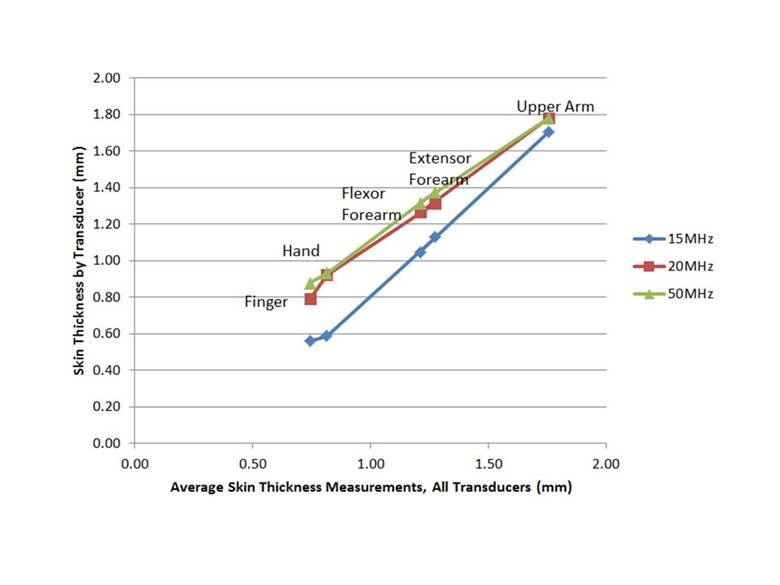Session Information
Session Type: Abstract Submissions (ACR)
Background/Purpose
Ultrasound has been used to measure scleroderma skin thickness, but it has not been established that routine clinical ultrasound equipment is adequate. We compared skin thickness measured with a common office instrument vs measurements using high frequency research ultrasound equipment, and determined the differences in measurement values and precision.
Methods
Repeated measurement of skin thickness of 1 normal volunteer at 5 reproducible sites on the dorsum of the proximal phalanx of a finger, the dorsum of a hand, the extensor surface and flexor surface of a forearm, and a lateral upper arm. A 15 MHz clinical ultrasound transducer and instrument (Sonosite, Bothell, WA), and 20 MHz and 50 MHz research transducers of a research ultrasound instrument (Sonosite, Bothell, WA) were used. After initial training, 3 examiners independently imaged all 5 sites with each transducer on 3 days over a period of one month. On each image, measurements of dermal thickness were made at 3 representative sites, and averaged to provide the thickness measure of that image.
Results
The overall average coefficient of variation (CV) was 8.6% for the 50 MHz transducer, 5.7% for the 20 MHz transducer, and 14.2% for the 15 MHz transducer. Measurements were more precise at the thicker skin of the arm (CV=5.6%) than at thinner sites. Thickness measured with 15 MHz was smaller than those of the 20 and 50 MHz transducers at all sites, but was generally reproducible at each site. Skin thickness at the finger vs hand differed significantly using the 20 and 50 MHz transducers, but the 15 MHz transducer results at those 2 sites were not statistically distinguishable. Measurements by one examiner were consistently smaller than those of the other 2 observers, whose values matched closely. All showed the expected increase in thickness by site (figure). 
Conclusion
The 15 MHz clinical ultrasound instrument is not as precise as higher frequency ultrasound equipment, especially in thin skin such as at the dorsum of the normal finger and hand. However, even at modestly thicker sites, such as the normal arm and forearm, the precision is acceptable. These data suggest that routinely-available mid-range clinical ultrasound equipment can be used to develop ultrasound-based skin thickness measurements, with the potential to improve the ability to monitor changes in skin thickness.
Disclosure:
I. A. Sacksen,
None;
P. S. Pollock,
None;
M. H. Wener,
None.
« Back to 2014 ACR/ARHP Annual Meeting
ACR Meeting Abstracts - https://acrabstracts.org/abstract/precision-of-ultrasound-skin-thickness-measurements-influence-of-examiner-and-ultrasound-transducer/
